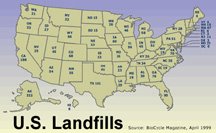Officials visit landfill before expansion ruling
BY Robert Wang
The Canton Repository
PIKE TWP - The lawyers dressed like construction workers. The appeals commissioners wore jeans and hard hats. And the court reporter struggled to type — as she rode on a bumpy gravel road at the Countywide Recycling and Disposal Facility.
Amid the steady rain, two of the three women who could decide Countywide’s future toured the landfill for less than an hour Friday. At stake: Millions of dollars in revenue, waste disposal for millions of Northeast Ohioans and the quality of life for hundreds of southern Stark County residents.
Environmental Review Appeals Commission members Toni Mulrane and Melissa Shilling did not indicate how they would rule on Countywide’s expansion. Shilling said they’re in the “final drafting stage.”
Nor did they say exactly why they came all the way from Columbus to the Pike Township landfill, when appeals commissioners, who are appointed by the governor, rarely make site visits.
In 2003, the Ohio Environmental Protection Agency granted Countywide a permit to expand from 88 acres to 258 acres, adding more than 30 years to its life. The village of Bolivar, the activist group Club 3000 and the Stark-Tuscarawas-Wayne Joint Solid Waste Management District appealed the EPA’s decision to the commission. They claim the expansion threatens the area’s water supply, on top of nearby residents’ complaints of odors and garbage truck traffic.
After 14 days of hearings in 2004 and 2005, the commission said in April that it wanted to visit the landfill.
At 10:30 a.m. Friday, Mulrane, Shilling, a court reporter, attorneys and their clients met in the offices of Countywide’s general manager, Tim Vandersall, and put on the required hard hats and bright vests. The third commissioner, Julianna Bull, was absent for personal reasons.
A strong odor of garbage greeted them as the commissioners and the court reporter got into a van. After they passed a line of garbage trucks, Vandersall showed them the deodorizing spray system, the black tarp that was containing landfill gases, and a flare burning off gas — all of which are devices being used to deal with the landfill’s odor problems.
Vandersall drove up an incline past the original 88 acres and then descended into the expansion area’s second cell, about 80 feet deep and 12 acres, that is being excavated. The commissioners saw heavy equipment compacting the trash in the first expansion cell, a 25-acre area, which will be filled with waste before this winter.
The commissioners asked few questions. Shilling said she was trying to link what she was seeing to the testimony from the hearings.
“It was interesting to see it under rain conditions, since water is an issue,” she said. “It was very helpful.”
When asked how what she had seen would influence her, all Shilling would say is, “That will be in our (legal) opinion.”
The Canton Repository
PIKE TWP - The lawyers dressed like construction workers. The appeals commissioners wore jeans and hard hats. And the court reporter struggled to type — as she rode on a bumpy gravel road at the Countywide Recycling and Disposal Facility.
Amid the steady rain, two of the three women who could decide Countywide’s future toured the landfill for less than an hour Friday. At stake: Millions of dollars in revenue, waste disposal for millions of Northeast Ohioans and the quality of life for hundreds of southern Stark County residents.
Environmental Review Appeals Commission members Toni Mulrane and Melissa Shilling did not indicate how they would rule on Countywide’s expansion. Shilling said they’re in the “final drafting stage.”
Nor did they say exactly why they came all the way from Columbus to the Pike Township landfill, when appeals commissioners, who are appointed by the governor, rarely make site visits.
In 2003, the Ohio Environmental Protection Agency granted Countywide a permit to expand from 88 acres to 258 acres, adding more than 30 years to its life. The village of Bolivar, the activist group Club 3000 and the Stark-Tuscarawas-Wayne Joint Solid Waste Management District appealed the EPA’s decision to the commission. They claim the expansion threatens the area’s water supply, on top of nearby residents’ complaints of odors and garbage truck traffic.
After 14 days of hearings in 2004 and 2005, the commission said in April that it wanted to visit the landfill.
At 10:30 a.m. Friday, Mulrane, Shilling, a court reporter, attorneys and their clients met in the offices of Countywide’s general manager, Tim Vandersall, and put on the required hard hats and bright vests. The third commissioner, Julianna Bull, was absent for personal reasons.
A strong odor of garbage greeted them as the commissioners and the court reporter got into a van. After they passed a line of garbage trucks, Vandersall showed them the deodorizing spray system, the black tarp that was containing landfill gases, and a flare burning off gas — all of which are devices being used to deal with the landfill’s odor problems.
Vandersall drove up an incline past the original 88 acres and then descended into the expansion area’s second cell, about 80 feet deep and 12 acres, that is being excavated. The commissioners saw heavy equipment compacting the trash in the first expansion cell, a 25-acre area, which will be filled with waste before this winter.
The commissioners asked few questions. Shilling said she was trying to link what she was seeing to the testimony from the hearings.
“It was interesting to see it under rain conditions, since water is an issue,” she said. “It was very helpful.”
When asked how what she had seen would influence her, all Shilling would say is, “That will be in our (legal) opinion.”

